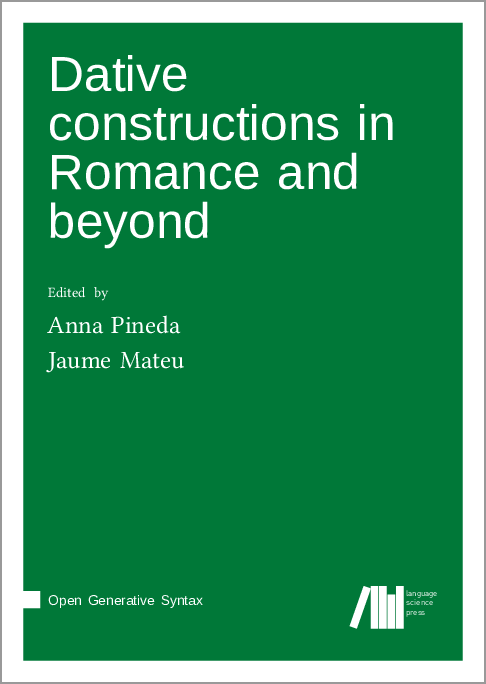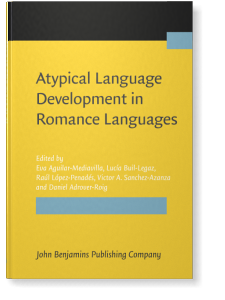In der letzten Zeit sind u.a. diese frei verfügbaren Titel erschienen:
Dative constructions in Romance and beyond
Anna Pineda & Jaume Mateu (Hrsg.) | https://doi.org/10.5281/zenodo.3744254
This book offers a comprehensive account of dative structures across languages –with an important, though not exclusive, focus on the Romance family. As is well-known, datives play a central role in a variety of structures, ranging from ditransitive constructions to cliticization of indirect objects and differentially marked direct objects, and including also psychological predicates, possessor or causative constructions, among many others. As interest in all these topics has increased significantly over the past three decades, this volume provides an overdue update on the state of the art. Accordingly, the chapters in this volume account for both widely discussed patterns of dative constructions as well as those that are relatively unknown.
Zur Reihe „Open Romance Linguistics“ in der Language Science Press gibt es auch einen Blog-Post vom FID Romanistik.
Atypical Language Development in Romance Languages
Eva Aguilar-Mediavilla / Lucía Buil-Legaz / Raúl López-Penadés / Victor A. Sanchez-Azanza / Daniel Adrover-Roig | https://doi.org/10.1075/z.223
This book presents a range of ongoing studies on atypical language development in Romance languages. Despite the steady increase in the number of studies on typical language development, there is still little research about atypical language development, especially in Romance languages. This book covers four main conditions causing atypical language development. Part I explores the linguistic and communicative characteristics of preterm children learning Romance languages. The focus of Part II centers on children with Specific Language Impairment. Hearing Loss in Part III is another relevant factor leading to atypical language development. The final part IV zeroes in on genetic syndromes coupled to cognitive impairment with special attention to language development. This book presents a much needed overview of the most recent findings in all relevant fields dealing with atypical language development in children speaking Romance languages.
Gender mismatches in partitive constructions in French and German: How society shapes language
Thom Westveer | https://dx.medra.org/10.48273/LOT0600
Partitive constructions involving human referents (e.g. one of the students) may give rise to gender agreement mismatches between set and subset in some languages. Native speakers have intuitions about whether such mismatches are acceptable or not. Gender mismatches in partitive constructions have not received much attention in the literature yet, but are particularly interesting in the light of the ongoing discussions on gender equal language, which challenge the existing gender systems in many languages. This dissertation investigates which factors influence the acceptance of gender mismatches by speakers of French and German and discusses those factors in the light of the ongoing discussions on gender equal language. Furthermore, it proposes a novel theoretical explanation for the observed facts within the framework of Generative Grammar. As such, this dissertation does not only give insight into an understudied phenomenon, gender agreement in partitive constructions, but also contributes to our understanding of how social factors may influence language and eventually could cause language change.



